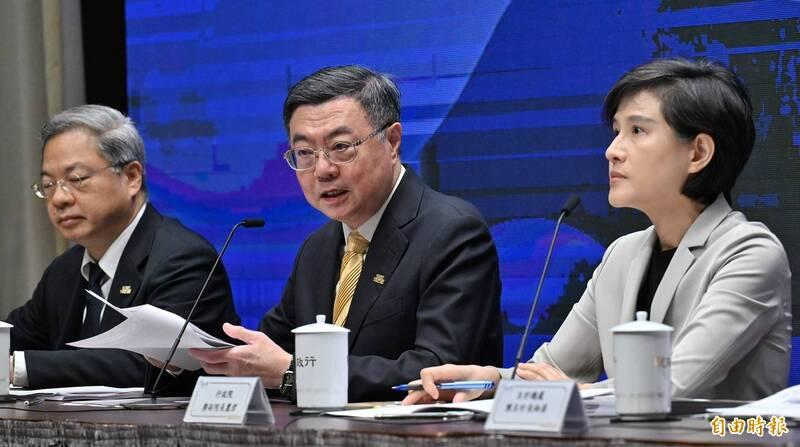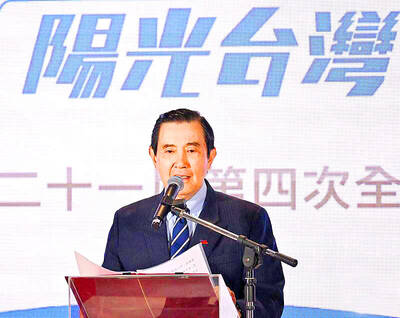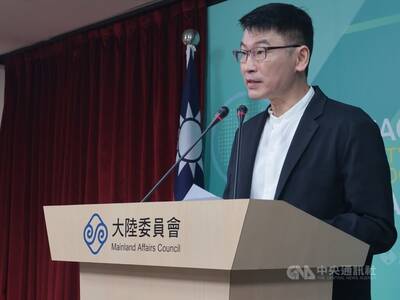A new central government budget proposal for next year approved by the Executive Yuan today does not include pay adjustments for certain civil servants for the sake of equality, Premier Cho Jung-tai (卓榮泰) said today.
When the budget is formally submitted, the Executive Yuan would seek constitutional judgements for two pieces of legislation, the Police Personnel Management Act (警察人員人事條例) and Pay Act of the Armed Forces (軍人待遇條例) and adjust it depending on those results, Cho said at a news conference today after the Executive Yuan meeting.

Photo: Liu Hsin-te, Taipei Times
The government has spared no effort in providing for military, police and firefighters, Cho said, adding that this year’s supplementary budget already includes funding for military benefits set to increase next year.
In January, the Legislative Yuan passed amendments to the Police Personnel Management Act that raised the monthly income replacement ratio for police, firefighters, coast guard personnel, National Immigration Agency officers and airborne service personnel.
The amendments set the monthly income replacement ratio at 43.25 percent for those in service for 15 years, with the ratio going up by 1.75 percentage points per year until they reach 80 percent at 36 years of service.
In June, lawmakers passed amendments to the Pay Act of the Armed Forces that provided NT$30,000 (US$1,002) monthly allowance for voluntary military service members and higher salaries for those in combat units.
The budget did not include adjustments from the two acts due to the controversies surrounding them, Cho said.
If necessary, retroactive payments would be issued to personnel, Cho added.
Next year’s total revenues for the government are expected to reach NT$2.862 trillion (US$93.96 billion), a decrease of about 9.6 percent, or NT$302.5 billion, compared to this year’s mark of NT$3.16 trillion, Cho said.
Expenditures are budgeted to increase by NT$110 billion to NT$3.035 trillion, an increase of about 3.8 percent, Cho said.
The new budget regulations would see the central government in a fiscal deficit, Cho said, after it is set to provide local governments with NT$416.5 billion in support.
After taking into account the central government budget and the special budget, the overall deficit would stand at NT$400 billion, Cho said.
Even with the budget cuts, the government has many responsibilities, Cho said, including defense spending, funding health and welfare, long-term care for seniors and new major AI initiatives.
Cho also called for bipartisan discussions to reach a consensus on questions within the budget.
There have been three pay raises in four years for military personnel and public servants, accounting for an 11-percent increase in total, leading some to worry that another pay raise while the government takes on debt would create negative public opinion, people familiar with the matter said.
The slowdown in economic growth, amendments to the Act Governing the Allocation of Government Revenues and Expenditures (財政收支劃分法), US tariffs and a nationwide cash handout are factors that have been taken into account, Executive Yuan spokesperson Michelle Lee (李慧芝) said.
Additional reporting by Chung Li-hua

‘ANGRY’: Forgetting the humiliations and sacrifices of ‘the people of the Republic of China’ experienced disqualified Lai from being president, Ma Ying-jeou said Former president Ma Ying-jeou (馬英九) yesterday criticized President William Lai (賴清德) over what he called “phrasing that downplayed Japan’s atrocities” against China during World War II. Ma made the remarks in a post on Facebook on the 80th anniversary of the end of World War II. Ma said he was “angry and disappointed” that Lai described the anniversary as the end of World War II instead of a “victory in the war of resistance” — a reference to the end of the Second Sino-Japanese War (1937-1945). The eight-year war was a part of World War II, in which Japan and the other Axis

The Mainland Affairs Council (MAC) yesterday announced a ban on all current and former government officials from traveling to China to attend a military parade on Sept. 3, which Beijing is to hold to mark the 80th anniversary of the end of the Second Sino-Japanese War. "This year marks the 80th anniversary of the end of World War II and the Republic of China’s victory in the War of Resistance [Against Japan]," MAC Deputy Minister and spokesperson Liang Wen-chieh (梁文傑) told a regular news briefing in Taipei. To prevent Beijing from using the Sept. 3 military parade and related events for "united

Eight restaurants in Taiwan yesterday secured a one-star rating from the Michelin Guide Taiwan for the first time, while three one-star restaurants from last year’s edition were promoted to two stars. Forty-three restaurants were awarded one star this year, including 34 in Taipei, five in Taichung and four in Kaohsiung. Hosu (好嶼), Chuan Ya (川雅), Sushi Kajin (鮨嘉仁), aMaze (心宴), La Vie by Thomas Buhner, Yuan Yi (元一) and Frassi in Taipei and Front House (方蒔) in Kaohsiung received a one-star rating for the first time. Hosu is known for innovative Taiwanese dishes, while Chuan Ya serves Sichuan cuisine and aMaze specializes

‘OFFSHORE OPERATIONS’: Also in Dallas, Texas, the Ministry of Economic Affairs inaugurated its third Taiwan Trade and Investment Center to foster closer cooperation The 2025 Taiwan Expo USA opened on Thursday in Dallas, Texas, featuring 150 Taiwanese companies showcasing their latest technologies in the fields of drones, smart manufacturing and healthcare. The Taiwan External Trade Development Council (TAITRA), the event’s organizer, said the exhibitors this year include Hon Hai Precision Industry Co (Foxconn), the world’s largest contract electronics manufacturer; AUO; PC brand Asustek Computer; and drone maker Thunder Tiger. In his opening speech, TAITRA chairman James Huang (黃志芳) said he expected Texas to become a world-class center for innovation and manufacturing as US technology companies from Silicon Valley and Taiwanese manufacturers form an industrial cluster